This is our gay guide to Beirut featuring the best gay bars and clubs, events, gay friendly hotels, safety tips, and the best things to do in the Lebanese capital.
Lebanon is one of the most liberal, progressive, and gay friendly places in the Arab world. This is saying a lot for a country where homosexuality is still punishable by law. However, in comparison to its Arab neighbors, Beirut has the best (albeit quite underground) gay scene, including one of the largest gay clubs in the Middle East called POSH.

We visited Beirut from Cyprus to celebrate Stefan's birthday over a long weekend and loved the food, the people, and of course the many gay parties.
Heads up: We just wanted to let you know that this post contains affiliate links. That means if you book something through one of those links, we'll get a small commission, at no extra cost to you. It helps us keep our blog going – so thank you in advance for your support! ♥
Don't forget…
Gay apps such as Grindr are blocked on mobile networks in Lebanon. Before heading off, make sure you get a VPN that will not only secure your internet connection wherever you are but also keep your online activities private and allow you to surf the Net anonymously.
Gay rights in Lebanon
Lebanon doesn't have the best track record with regard to LGBTQ rights. Homosexuality is illegal, there are no anti-discrimination laws, there is absolutely zero recognition of LGBTQ partnerships, and the LGBTQ community are banned from openly serving in the Lebanese army.
On the plus side, proactive steps are being taken by judges and some politicians to legalize homosexuality. For example, in 2013, it was declassified as an illness. In addition, the right to change legal gender was introduced in 2016. From our experience traveling in the Middle East, Lebanon definitely ranks as one of the most gay friendly Arab countries, but remember, this is an extremely conservative region of the world when it comes to LGBTQ rights.
Landing in Beirut soon?
There isn't any public transport system to get from Beirut–Rafic Hariri International Airport to the city, so we definitely recommend organizing a private airport transfer instead of trying to find a cab. Your driver will be waiting to take you straight to your hotel in comfort and without any stress.
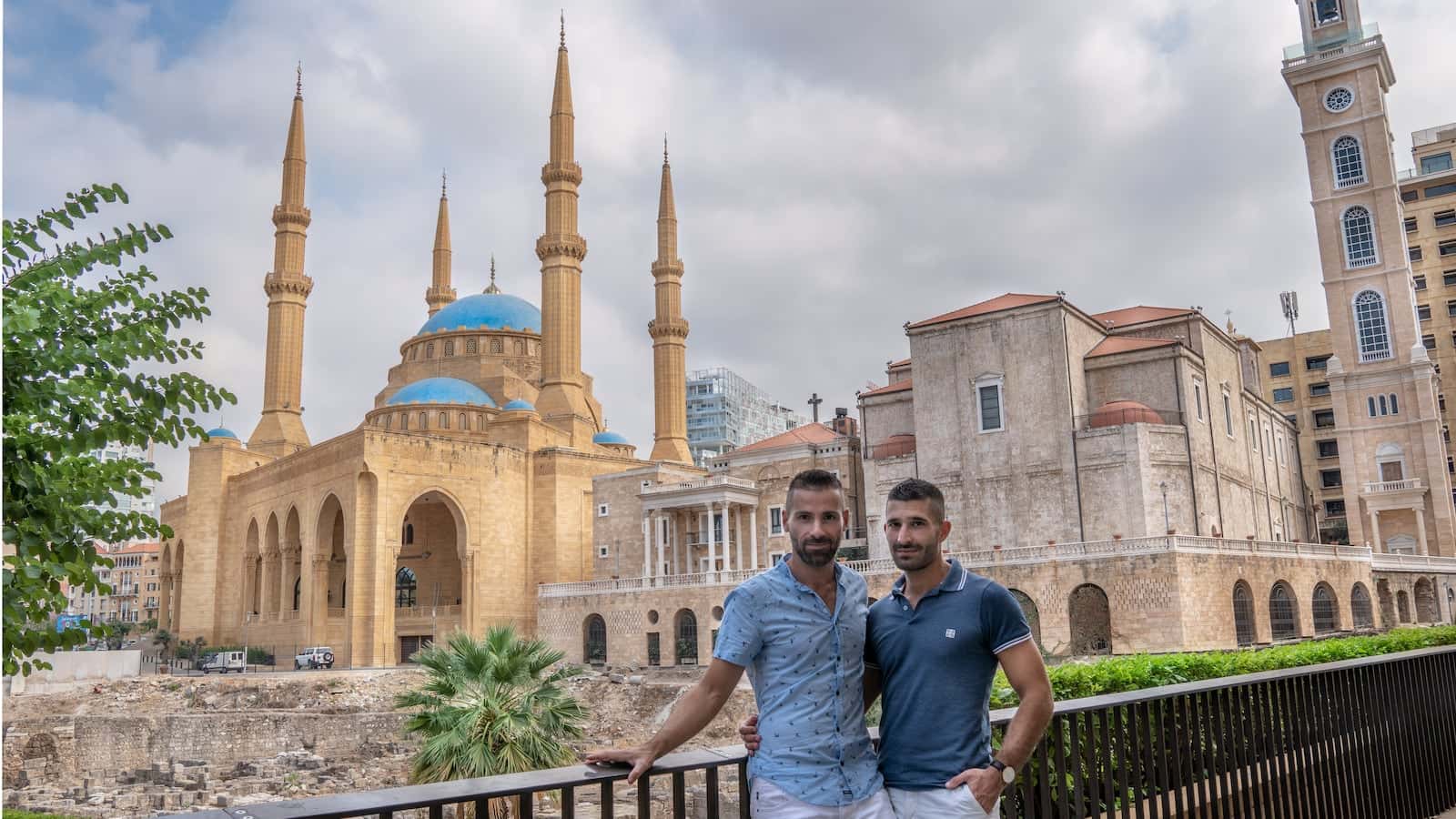
Is Beirut safe for gay travelers?
A word of warning to gay travelers to Beirut, although Lebanon is more progressive than places like Iran, Dubai, and Abu Dhabi, it is a country where homosexuality remains illegal.
Therefore, be careful with public displays of affection and avoid posting anything online that is LGBTQ-related before/during your trip to prevent any problems at the airport immigration. Also, avoid having an Israeli stamp on your passport as Lebanon has an outright ban on anything related to Israel/Israelis. Be sure to check out our article about gay life in Lebanon for more practical safety tips as well as our traumatic experience at Beirut Airport with the Immigration Police.
Gay friendly hotels in Beirut
As a rule of thumb, the large international hotel brands are likely to be gay friendly, wherever they are in the world because they usually abide by a strict set of international standards. Despite this, we strongly advise emailing/calling ahead first to double-check they are ok to host gay travelers and will let you book a double bed.
In Beirut, you'll want to stay in the center around Hamra, which is where most of the tourist sites are. These are the gay friendly hotels in Beirut that we tried and welcomed us (ie a gay couple!).
01
Hilton Beirut Habtoor Grand Hotel
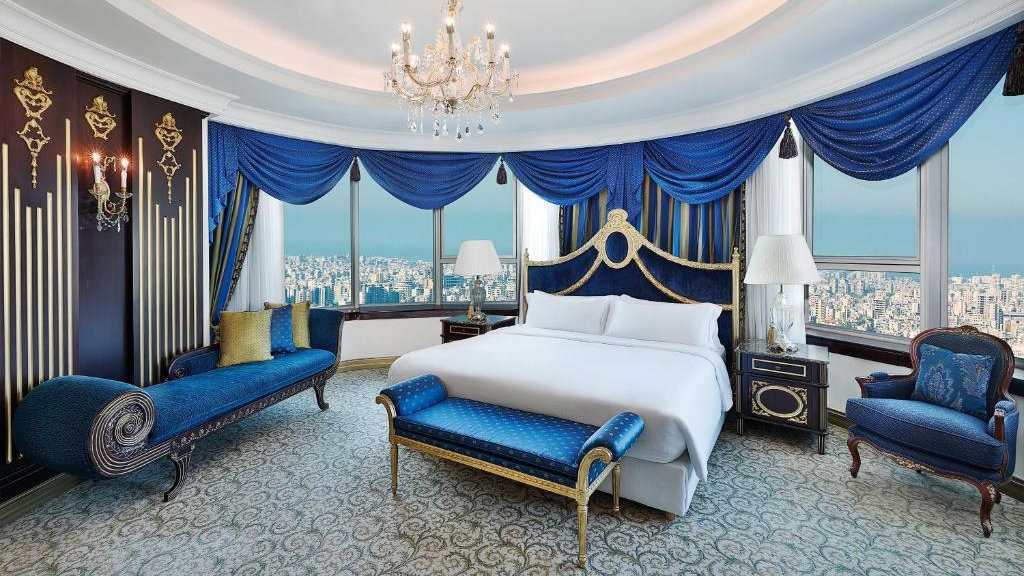
Why we love it
- Stunning 5-star hotel
- Swimming pools and luxurious spa
- Multiple excellent restaurants and bars on-site
- Very welcoming to LGBTQ guests
Opulence! Darling, you own EVERYTHING! That's how we felt as we sashayed our way into the main lounge of the divine Hilton Habtoor Grand Hotel…
This is one of the best 5-star luxury hotels in Beirut. It has an excellent spa, an impressive fitness center to burn off all those kanafeh calories, and a stunning outdoor swimming pool – with a jacuzzi, fountains, and a pool bar.
The Hilton brand is known for welcoming LGBTQ travelers so you won’t feel the need to go back into the closet while staying here. The incredible Elixir Spa is a haven for pampering and relaxation, with couple's treatments available for a touch of extra romance!
Rooms here are all about luxury, with plenty of space, comfortable beds, huge marble bathrooms, and private balconies. If you really want to feel like a princess (or a Queen) then you can’t go past the incredible penthouse suite! But even if you’re not made of money, you’ll feel like royalty here.
There are a variety of high-end restaurants and bars which are worth visiting even if you're not staying at the hotel. Le Ciel serves fine French cuisine on the 31st floor, with stunning views over the city. You can also just come here for a drink in the jazz bar. The Oak Lounge is perfect for a coffee and a snack while Al Diyafah is where you can start your day off with a hearty breakfast. Habtoor Plage is a stylish restaurant and bar located next to the swimming pool, where you can have a healthy lunch and an indulgent cocktail.
STAY WITH A GAY LOCAL
Misterb&b is the Airbnb equivalent for the LGBTQ community. Unlike on Airbnb, you know your host is gay, avoiding any nasty surprises when you check in. It's also a great way to meet gay locals and discover the underground gay scene. Click below to get €10 / $10 off your first booking.
02
Casi Cielo Bed and Breakfast
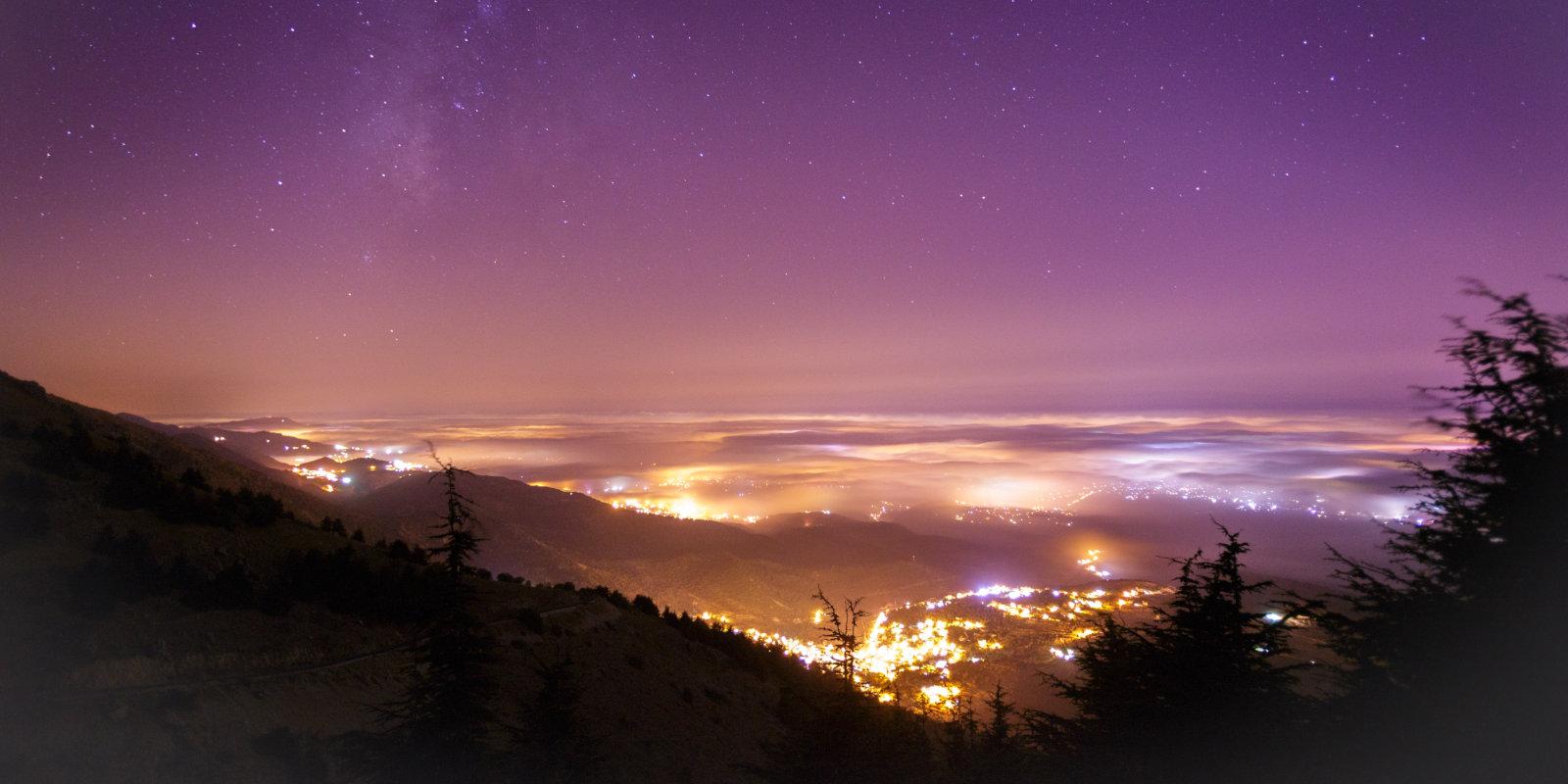
Why we love it
- Gay friendly bed and breakfast
- Be surrounded by nature and views
- Cozy wood-burning stoves in rooms
- Complimentary gourmet breakfast
Casi Cielo is a gay friendly guesthouse located in Lassa, around a 1-hour drive from downtown Beirut.
It's the perfect place to stay to get a feel for the Mount Lebanon mountain area and also to get a flavor of local life.
The Lebanese hosts are not only extremely personable, they also offer fun group activities like cooking classes, biking, and hiking.
The rooms are cute and cozy, with wood-burning stoves to cuddle up in front of at night. A full gourmet country-style breakfast is served every morning in the common room, and this is included in your room rate. They even provide complimentary cheese and wine in the evening, which is a lovely way to socialize with your hosts.
Even though this is a budget accommodation option the rooms are impeccably cleaned and you'll have your own private bathroom as well. In the warmer months, the garden is a delightful spot to relax away from the hustle and bustle of the city. If you want to stay somewhere close to Beirut but still be surrounded by nature and quiet, then this is a wonderful choice.
03
Grand Meshmosh Hotel
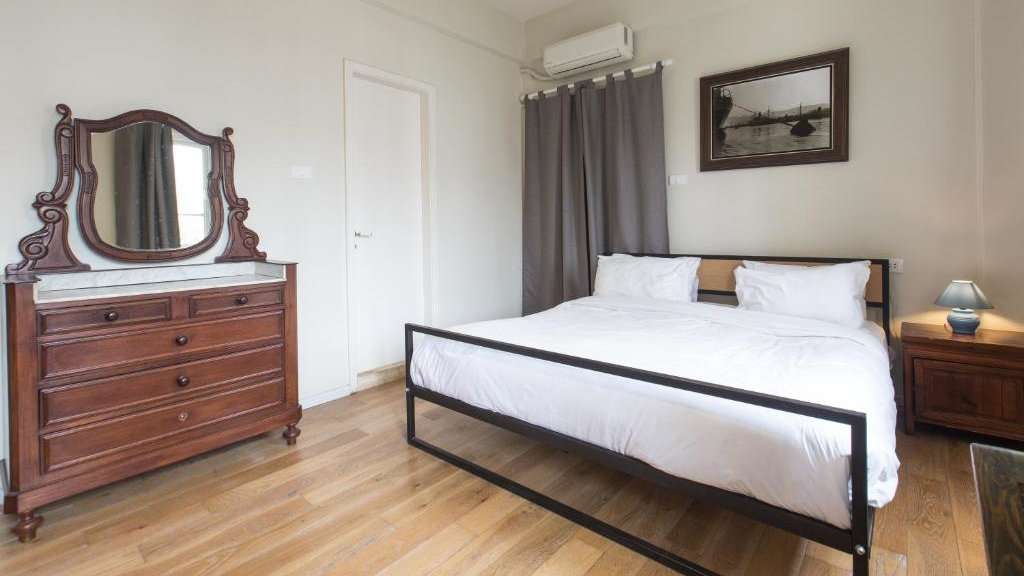
Why we love it
- Excellent budget choice
- A cross between a hotel and a hostel
- Excellent complimentary breakfast
- Very friendly and helpful staff
The Grand Meshmosh Hotel is actually a mix of a hotel and a hostel, so you can book a single bed in a dorm, a private double room or private rooms with up to three beds in them. The bathrooms are also a mix of private and shared, while all areas are always impeccably clean.
It's located right next to the St Nicholas Stairs, within walking distance of some excellent art galleries and museums, along with the swanky Sursok Palace.
The staff at The Grand Meshmosh Hotel are very helpful and accommodating. They'll help you figure out where to catch local transport and even carry luggage up the stairs. This is not going to be a luxury experience, but it's one of the best and cleanest hostel-style accommodations you're ever likely to find.
Some of the rooms come with a little kitchenette with a fridge and microwave. There's also food available in the restaurant and in supermarkets nearby. The complimentary breakfast is delicious and quite extensive, plus there's a cold water fountain where you can fill up a water bottle whenever you want. Unlike some other hostels in Beirut, this one also has air conditioning, which trust us, is a godsend!
Gay bars in Beirut
Sadly the number of gay bars in Lebanon has taken a massive tumble post-Covid, with almost all of them closing down forever, especially, Bardo. A few gay friendly spaces remain, which we've listed below, but the best advice is to connect with gay locals on gay dating apps (via a VPN!) and find out if any ad hoc parties are happening.
The following gay bars in Beirut fell victim to the ongoing economic problems Lebanon is having: Bardo, and Kahwet Al Franj.
Om
Previously known as Madame Om, the new Om Bar Room has reopened in a new location but is just as fabulous as ever! Om is a lovely mix of a bar and a lounge, where diversity, love and dance are all celebrated. Just like Madame Om, this new Om plays a mix of old-school R&B as well as modern Arabic hits that will have you dancing away until the wee hours. Located on Mar Mikhael's main street (next to the fire brigade) Om is open every day from 4 or 5pm until the early hours of the morning.
Cafe Younes
This is a Bohemian gay friendly cafe in the heart of Beirut just off Hamra Street, perfect for people-watching. They do excellent coffee, especially Lebanese coffee infused with Cardamon. Cafe Younes is open every day until the early evening and is located on Nehmeh Jafet Street near where it meets Hamra Street.
Cloud 59 beach bar
Cloud 59 is a lesbian-owned beach bar/restaurant located in Tyre, a seaside resort town around 1-hour drive south of Beirut. Although it's outside the capital city, we include it because this is one of the most popular gay friendly beaches in Lebanon where the Beirut gay boys like to hang out on weekends. The beach bar serves food and refreshing cocktails, which you can enjoy right on the sand or while relaxing in a hammock.
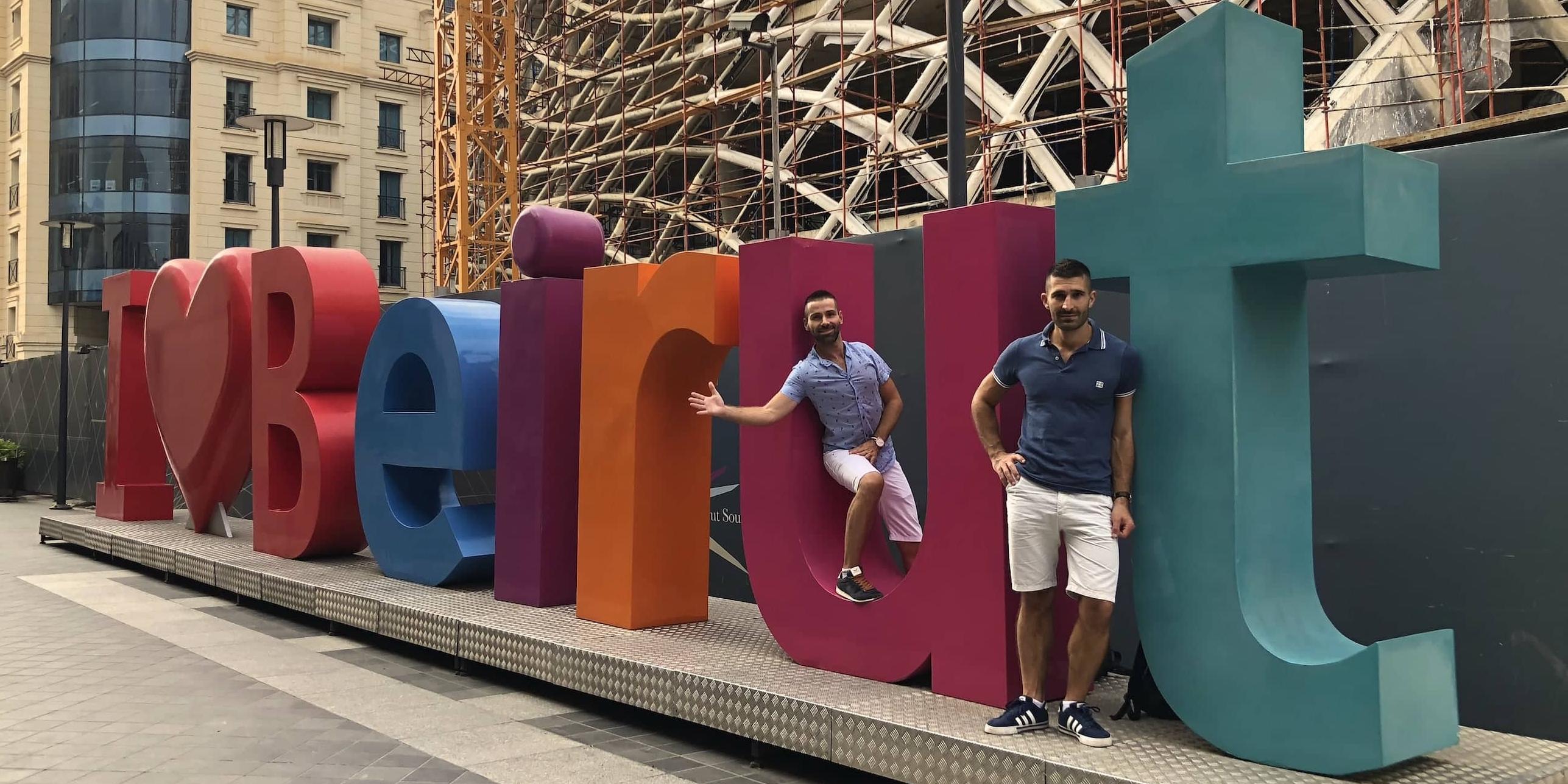
Gay clubs in Beirut
There are a handful of gay clubs in Beirut, but as with the bars, there are no “official” advertised gay clubs in order to prevent police interference. Also, absolutely no close contact between two people of the same gender is allowed in the gay clubs of Beirut. If you try to be too close to your partner, the bouncers will come over to warn you to stop; the owners work hard to keep their licence and prevent problems with the authorities.
These are the main gay clubs in Beirut to check out:
POSH
POSH is a gorgeous rooftop club located in Bourj Hammoud (the Armenian quarter). It's not only the largest gay club in Beirut but also the largest in all the Arab countries. On Friday and Sunday evenings, it has mainly Arabic music. Saturday is the big night with both Arabic and Western pop music. Security is extremely strict here because they are careful not to get into trouble with the police. Therefore use of phones for photos is not allowed and a strict “no kiʂʂιng” policy is enforced! At the end of the night when leaving POSH, make sure you get a wristband for discounted entry to the gay after-party, which is usually Ego. POSH club is located at Bourj Hammoud Seaside Road behind Gallery Vanlian and is open every Friday, Saturday, and Sunday from 11 pm until late.
Ego party at Projekt Beirut
This is one of the best gay after-parties in Beirut. Most people go to POSH first, then head here at around 3 am and party into the early hours. It gets very busy, especially on weekends. Music is mainly electro and house. Overall, however, we found the crowd at Ego to be less friendly than at POSH. Ego is located at Projekt Jal El Dib, Seaside Road, and is open on Friday and Saturday evenings until around 6 am.
B018
B018 is pronounced B dix-huit locally. It is one of the most famous clubs in Beirut that prevailed during the difficult years of 1975 to 1990. It is set inside a chalet where customers had to use the code “B 018” to enter (named after the chalet's location 18 km north of Beirut). Today B018 is located at a different location but has retained the same name. Officially B018 is a straight club, but it attracts a large LGBTQ crowd. B018 is open Thursday, Friday, and Saturday from late until 8 am the next morning.
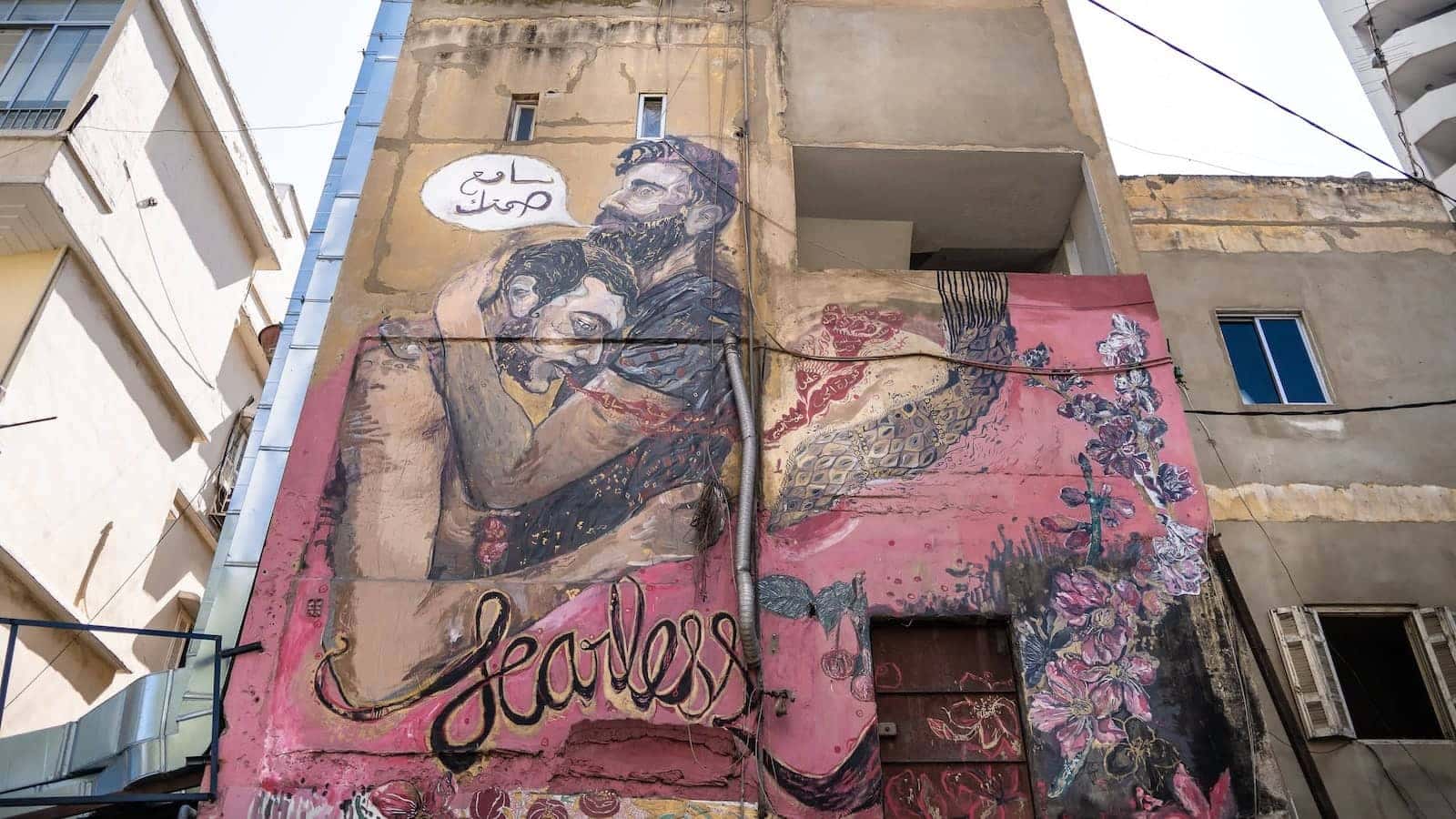
Looking for a gay friendly tour guide in Beirut?
We've got your back! We've buddied up with an excellent company that can offer tours in and around Lebanon. However, for their security, they've asked to remain anonymous in this blog post. Therefore, if you're interested, message us privately by email or leave a comment in this article and we'll get you introduced electronically pronto.
Gay events in Beirut
Given the lack of legal protection for the gay community in Lebanon, there is nonetheless a handful of active LGBTQ organizations that organize several gay events in Beirut throughout the year. The main gay events are Beirut Pride in late September and the weekly gay events organized by HELEM. We've also included a few other interesting non-gay-specific events that you may want to check out:
Helem Community Center weekly gay events
Helem (which means dream in Arabic) was the first LGBTQ organization in Lebanon and has been going strong since 2004. Every week they organize a range of events for the gay community like lunches, storytelling nights, movie nights, a queer book club, craft activities, workshops on hobbies like photography, and lots more. Make sure you check their Facebook page to see what's on and drop by when you're in Beirut!
Beirut Fashion Week (April)
Lebanon is known as the leader of the fashion industry in the Arab world and the entire Middle East so it's not surprising that Beirut hosts an internationally recognized fashion week event. Beirut Fashion Week is one of the biggest international events in all Arab countries. It has grown massively in popularity over the years and also includes the Beirut Fashion Awards.
Beirut Design Week (June)
Similarly to fashion week, Beirut Design Week is one of the largest design festivals in the Middle East, going strong since 2012. Beirut Design Week provides a space for artists from around the world to network, although anyone who's interested can attend the events on the program, like film screenings, panel discussions, exhibitions, and even workshops for activities like learning how to embroider with local women.
Baalbeck International Festival (July)
One of the most famous cultural events in Lebanon was first established in 1956. It involves theatre, classical/pop music, and opera, attracting tourists from all around the world to the Roman Acropolis location in Baalbek. The festival puts particular emphasis on showcasing world-renowned artists with Lebanese roots such as Ibrahim Maalouf and Matthieu Chedid.
Beirut Pride (Sept/Oct):
Lebanon was the first country in the Arab world to plan a Pride event in 2017. For the most part, it went ahead, but police interference meant that much of it was stopped. In 2018, the founder, Hadi Damien was arrested and only released on condition that he agreed to cancel it. Since 2018, Beurit Pride largely went ahead each year without too many problems (with the exception of 2020 and 2021 due to Covid). For the latest info check out the Beirut Pride Facebook page.
Beirut Marathon (November)
The Beirut marathon has the theme of unity at its core and the day-long event includes a race for politicians from any party. The main 42km marathon goes all around the city including Hamra and the Gemmayzeh neighborhood before finishing at Martyr’s Square. More than 47,800 runners from around the world compete in the marathon, while tens of thousands of spectators line the streets.
Gay saunas in Beirut
As homosexuality is technically illegal in Lebanon, you will be hard-pressed to find an official gay sauna in Beirut, particularly since the raid of the Hammam Al-Agha in 2014 when 40 people were arrested.
And over the last few years, the government has been cracking down heavily on LGBTQ activity – so much so that the saunas and bathhouses we listed here previously contacted us to remove them from our guide.
Your best bet to find action is via online dating apps, in particular Grindr and Scruff. We advise using a VPN to log into them for your safety. Please take care before agreeing to meet anyone and read our safety tips for using gay dating apps.
Our favorite restaurants in Beirut
Beirut is one of the oldest cities in the world, so you can sample traditional Lebanese cuisine with the freshest Middle Eastern herbs, garlic, lemon juice, and olive oil. Since the city is located on a peninsula of the Mediterranean, you'll have ample chances to dine on fresh seafood as well. These were our favorite places to eat in Beirut:
Basterma Mano
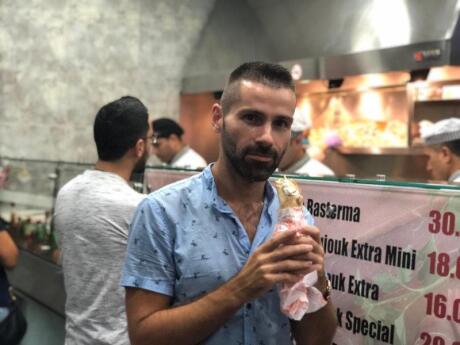
This is our favorite place in Beirut for shawarma. They are really good, especially the “Basterma pastrami” or “soujouk” spicy sausage shawarma. As well as the delicious sandwiches you can also buy authentic Armenian sausages or a burger and fries. Just go easy on the heavier meats otherwise you'll have heavy garlicky burps and breathe all night! Basterma Mano is located in Bourj Hammoud (the Armenian Quarter) of Beirut. Service is quick and the staff is very friendly here too!
L'abeille D'or

L'abeille D'or is a famous chain cafe/bakery in Lebanon, which means “Golden Bee” in French. We love it because they do one of the best “kanafeh” dishes we've tried. Kanafeh is a Lebanese breakfast dish containing melted cheese and semolina dough that has been soaked in syrup and is then served on Lebanese bread. They also bake traditional baklawa, petit fours, karabij, and nammoura. There are lots of branches throughout the city, so no matter where you're staying you can easily try some of their delicious Lebanese treats.
t-marbouta
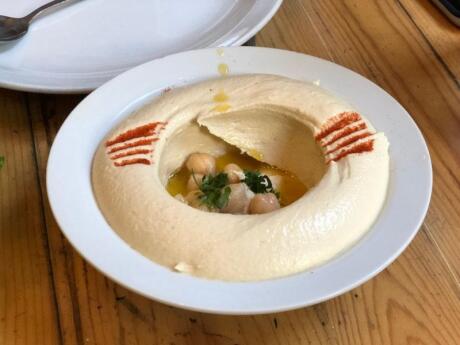
Located right in the heart of the busy Hamra Street, t-marbouta serves big portions of traditional Lebanese food. Everything is absolutely delicious and very fresh, especially dishes like the beef khishkhash with pilaf rice, or the homemade hummus and tabouleh. We loved the leafy interior courtyard that gets filled up with locals and travelers, while the staff are very helpful in explaining the menu or making suggestions. The atmosphere is casual and relaxed, perfect for sharing big mezze platters with friends.
Things to do in Beirut
It's not all about the food here, although a lot of it is! Along with the delicious different culinary discoveries, there are also many not-to-miss touristic highlights in Beirut:
Wander down Hamra Street
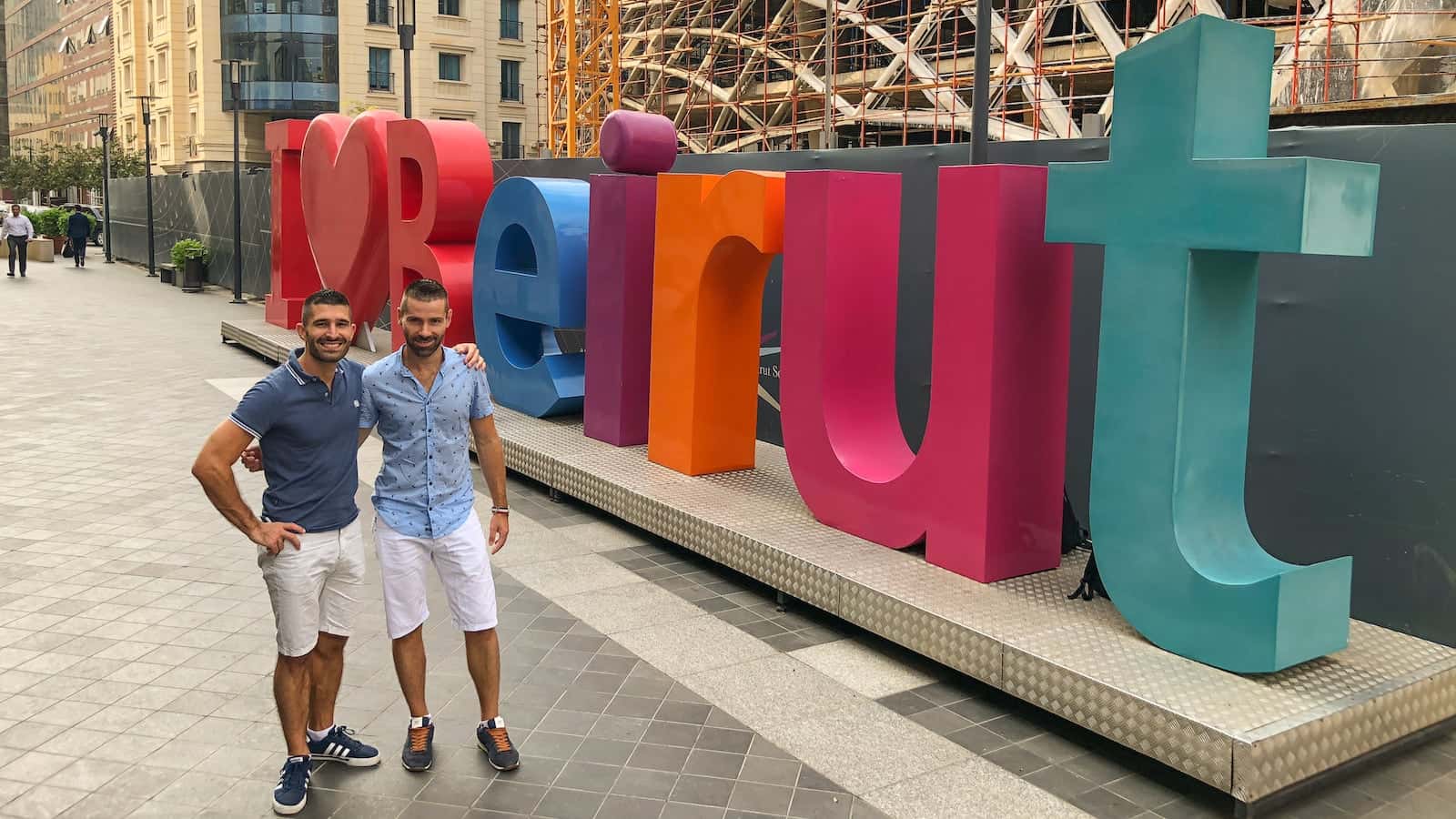
The famous artery of Beirut with tight narrow roads lined with cafes and shops in Hamra Street. It's always buzzing with life here, which makes it the perfect place for people-watching at one of the cool cafes or restaurants, with shisha to hand and some local mezze. With the many boutique shops and theatres, Hamra Street is sort of Beirut's answer to Paris's Champs Elysées. There's also an open-air bazaar at the end of the street selling jewelry, organic food, soaps, second-hand books, and more.
See the Pigeon Rocks of Raouche
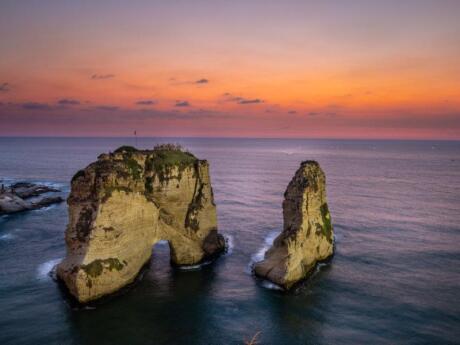
The Pigeon Rocks (sometimes called Raouche Rocks) are one of the iconic landscape images of Beirut, located in the Raouche neighborhood by the sea. They are two rock formations that, according to Ancient Greek mythology, are the remains of the sea monster that Perseus put an end to save Andromeda. The sea monster is now a rock because Perseus used Medusa’s head on the monster to turn it into stone. The best time to see them in all their glory is at sunset. You can view and take photos from the seaside promenade or maybe during dinner at Al Falamanki restaurant which overlooks the rock formation.
Stroll along the Corniche and Zaitunay Bay Marina
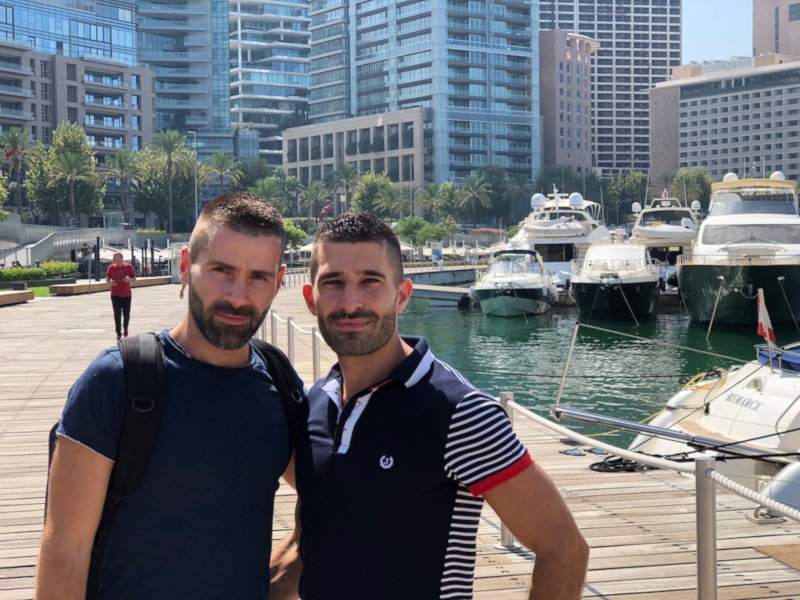
The Corniche is a 4.8 km (3 miles) seaside promenade lined with palm trees featuring both sea and mountain views. We love coming here for morning runs and then stopping at one of the coffee shops or restaurants for a lazy brunch. The highlight is following the Corniche to the Pigeon Rocks (see above) or strolling along to see local fishermen bringing in their catch and coffee sellers rapping their cups together like castanets.
The Zaitunay Bay Marina runs off the Corniche. It is Beirut's tranquil marina lined with shops, cafes and bars.
Go food crazy!
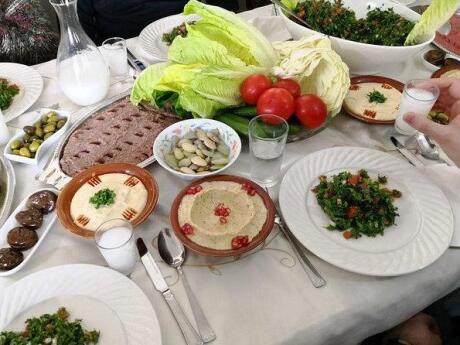
As we said, this is the city to go food crazy!
Dishes we recommend looking out for include “manoushe” (a cheese pie breakfast dish), “foul” (fava bean-based breakfast dish), “fatteh” (chickpeas, yogurt, and bread-based dish), “tabbouleh” (salad with parsley, tomatoes, onions, cracked wheat, lemon, and olive oil) and “fattoush” (salad with pomegranate molasses).
Explore some Lebanese wineries

Close to Beirut is the fertile Beqaa Valley, Lebanon's most important farming region and home to the country's most famous wineries.
The valley's climate is excellent for growing grapes, which is why wine-making has been a Lebanese tradition for the last 6,000 years! Chateau Ksara is the country’s oldest winery, which we recommend heading for tasting sessions and learning about the history of wine-making in Lebanon.
Go on a day trip to Baalbek
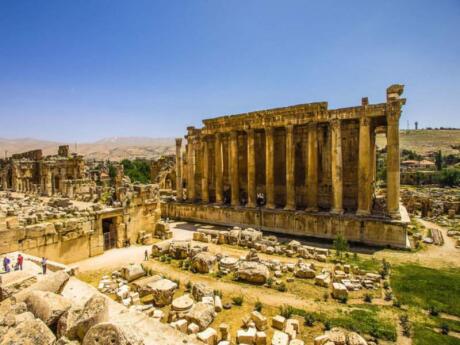
The city of Baalbek is one of the most famous cities in Lebanon and home to some of the most well-preserved Roman temples in the world. Taking a day trip to Baalbek to see the Temples of Jupiter, Bacchus and Venus is a fascinating way to learn more about Lebanon's ancient history. Now a UNESCO World Heritage site, there are also two small and interesting museums on the site. The ruins are also the venue for the Baalbeck International Festival which we mentioned in the events section.
See the sights at night
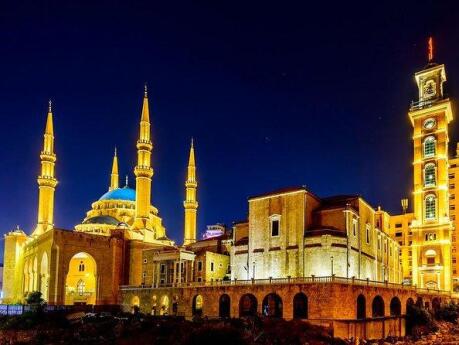
We've already talked about the best bars and clubs to visit during a night out in Beirut, but there's plenty more fun stuff to do once the sun goes down when the most beautiful spots are lit up.
The Mohammed Al-Amin Mosque (pictured) looks particularly stunning at night, after visiting it you can do some shopping in the bustling souks and also stop by Martyrs’ Square a tribute to martyrs executed by the Ottoman rule.
Check out the National Museum of Beirut
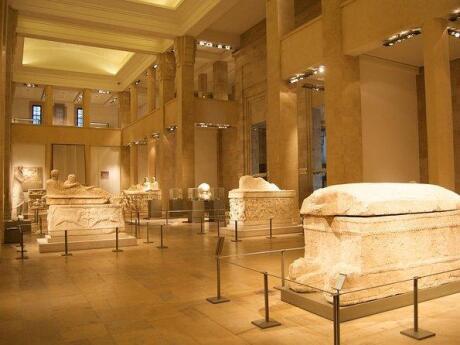
One of Beirut's major cultural institutions is the incredible National Museum of Beirut. The museum showcases archaeological artifacts from prehistory to the Ottoman era and is the main museum of archaeology in Lebanon. Don't miss seeing the famous Phoenician gilded bronze figurines which were found buried near the Obelisk Temple at Byblos. If you're particularly interested in Beirut and Lebanon's history, you can visit the museum as part of a historical walking tour. You'll also get to hear about the city's past, from its settlement more than 5,000 years ago to the collapse of the Ottoman Empire and recent events.
Hiking in the cedar forests of the Al Shouf Nature Reserve

The cedar forests in the Al Shouf Nature Reserve are perfect for hiking and getting out of the city.
Lebanon's cedar forests are the oldest documented forests in the world, even featuring prominently in The Epic of Gilgamesh, one of the oldest pieces of literature in the world.
If you spend some time in the Al Shouf reserve you might get to see a variety of animals and birds like the Griffon vulture, Caracal (a type of wild cat), wolves, jackals, and even golden eagles. Located on the slopes of Barouk Mountain, hiking here will also reward you with panoramic views over the Bekaa Valley and Mount Lebanon.
Tips to prepare for your trip
We've put together some handy hints and tips to help you plan your own trip to Beirut. Read on to find out everything the gay traveler should know before they go.
Travel insurance: We never travel without travel insurance and always recommend others do the same when visiting Lebanon. You just never know when something, like canceled flights, illness, or other unforeseen things, will cause you to fork out a wad of cash. We love Heymondo Travel Insurance because their cover is very comprehensive and it's easy to make an online claim if you need to.
How to get there: You will most likely be traveling to Beirut by plane, which means you will land at Beirut–Rafic Hariri International Airport. There is no public transport system from the airport to the Beirut city center, so you will need to get a taxi, uber, or (our personal choice) a private airport transfer. Luckily, the airport is very close to the city, so the trip is short and affordable. Check out our full guide to getting to the Beirut city center from the airport as well.
Visa requirements: Nearly all travelers to Lebanon will require a tourist visa to enter, although for many nationalities it is free, so long as you can show you have a return ticket and passport validity for at least six months after arrival. Do be aware that if you have a visa stamp from Israel on your passport you will likely be refused entry to Lebanon, so if you're planning on ever visiting Israel, make sure you go to Lebanon first! Check your personal visa requirements for Lebanon here.
Getting around: Public transport is kind of confusing and chaotic in Beirut, while walking can also be hectic due to the lack of pedestrian footpaths in many areas. We found Uber to be the safest and most efficient way to get around the city.
Currency: The currency used in Beirut and the rest of Lebanon is the Lebanese Pound, which is officially abbreviated to LBP but more often written as LL. $1 (US) converts to around LL1,513, €1 to about LL1,653, and £1 is worth about LL1,860. When written in Arabic (perhaps on a menu), the Lebanese pound symbol looks a bit like this: ل.ل.
Tipping culture: Tipping is widespread in Lebanon, so you should always tip around 10% of your bill (or 15 for really excellent service) at restaurants, cafes, and bars.
Internet access: While the internet is famously slow in Lebanon, you will be able to do things like email and even stream Netflix. Nearly all cafes in Beirut offer free, decent WiFi so you can get some work done. If you think you'll be needing a lot of bandwidth then you might like to bring a portable WiFi device with you.
Online privacy: Gay apps like Grindr or Scruff are blocked in Lebanon but if you use a VPN service like ExpressVPN then you will be able to use the internet securely and keep your online activities private. We love using ExpressVPN as it's both an affordable and reliable way to get online safely.
Accommodation: For more accommodation options in Beirut, make sure you check out Booking.com, our favorite site to find places to stay. They have many choices, often provide free cancellation and their 24/7 online customer service is excellent.
Sightseeing and adventure: We also use GetYourGuide to find fun things to see and do in Beirut or anywhere else we're traveling to. It's so easy to book activities online, the customer support is wonderful and there are always lots of options to choose from.
When to visit: During summer Beirut gets very hot and busy, so we recommend visiting during spring (April-May) or autumn (September-November). The weather will still be warm and pleasant, plus there won't be as many crowds.
Should you boycott Lebanon?
We are always criticized for writing about places that have anti-gay laws. On the one hand, we quite understand the reason why. However, we strongly feel that this is not a productive way forward.
We feel it is more powerful to go over to places like Lebanon and be a positive, visible representation of the LGBTQ community. Visibility is the main thing that the local LGBTQ community is striving to achieve, so by boycotting them we are simply assisting the homophobic government to achieve its objectives!
We believe it is more productive to get out there and support local gay friendly businesses to help them thrive rather than boycotting them altogether. For this reason, we strongly feel that you should not boycott Lebanon.
It goes without saying that you should take extra care, in particular, avoid overt public displays of affection and invest in a VPN so you can browse online anonymously. Also, be careful of who you meet on Grindr.

Gay map of Beirut
We've made this map for you which shows all the best gay friendly places in Beirut that we've mentioned in this guide. Use it to help plan your own fabulous trip to Lebanon's exciting capital city!
Read more travel adventures like this in our book!
We've published our very own gay travel book called, ‘Out in the World'. It has all our practical safety tips, first-hand advice, and travel stories from some of our favorite destinations.
We hope it inspires you to have a fun and safe trip!
Click on the book to order:

For more inspiration:
- Check out the most gay friendly countries in the world
- As well as the biggest gay Pride events in the world
- We've got you covered for Pride outfit inspiration
- Use our gay Oman guide to plan your trip
- Speaking of Pride, check out our guide to experiencing gay pride in New York City
- Find out why we also love attending Pride in London
- If you're there anyway, make sure you check out some of these fabulous gay musicals and theatre shows in London
- And don't miss out on visiting at least one of the best drag clubs in London as well
- For more pride events, these are the best gay pride events in Spain
- As well as the best gay cities in Spain if you're looking to party
Like this post? Pin it
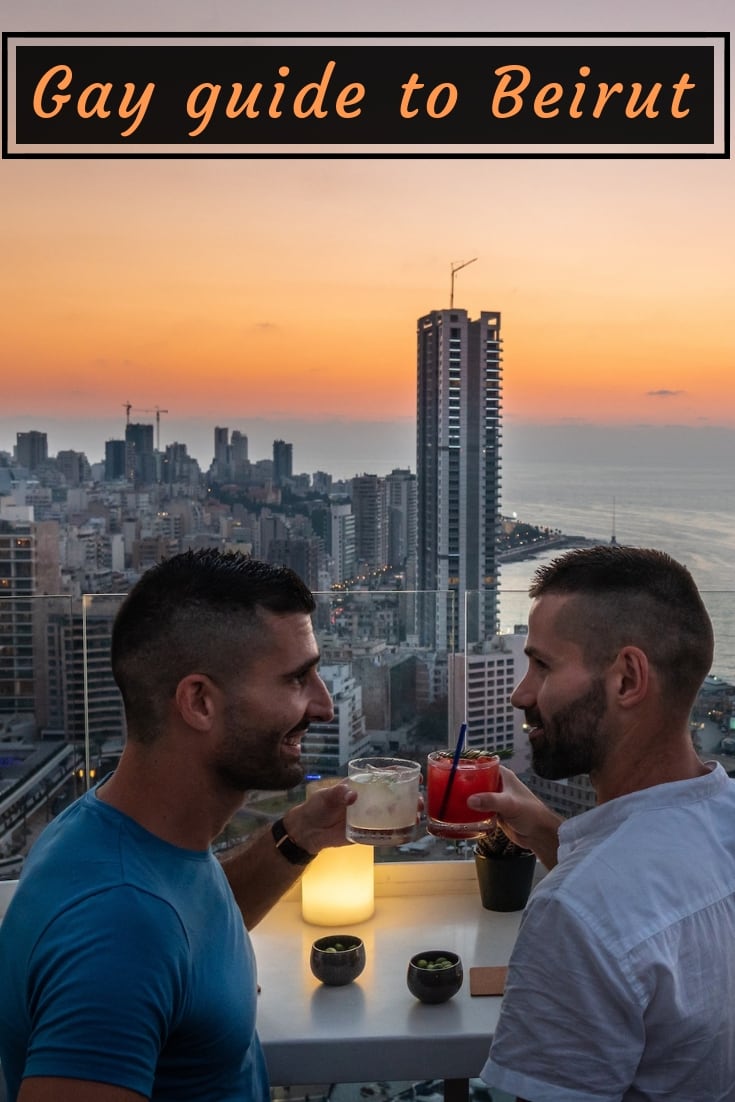
Happy travels are safe travels
We recommend you always take out reputable travel insurance before your next vacation. What happens if you suffer from illness, injury, theft, or a cancellation? Many gay travelers forget about it and regret it when something happens. Better to pay a small price and have peace of mind and not worry.

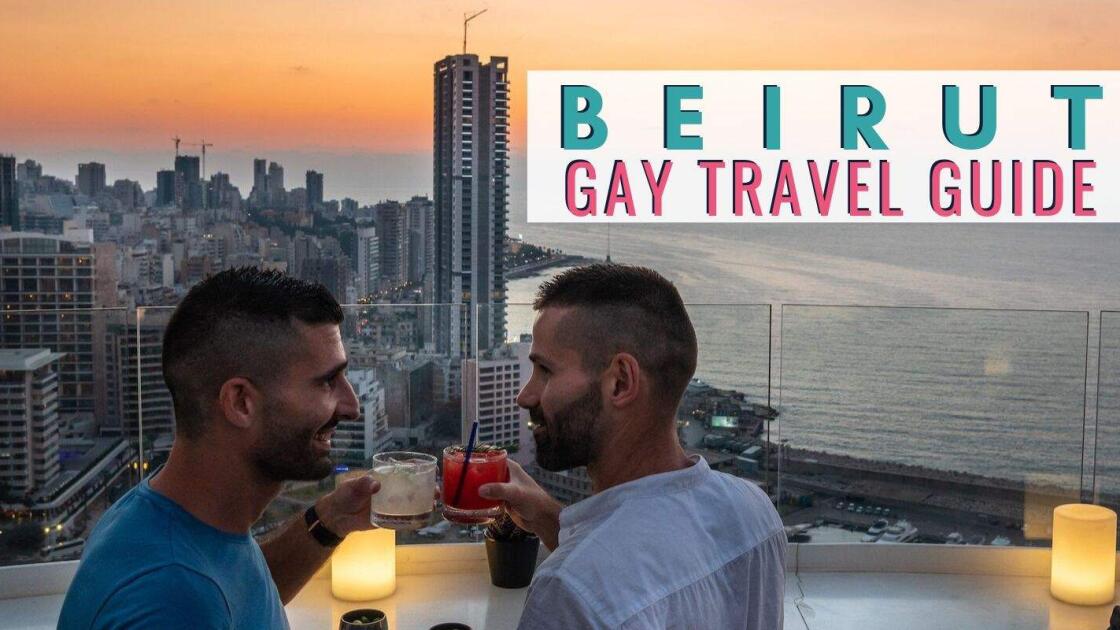
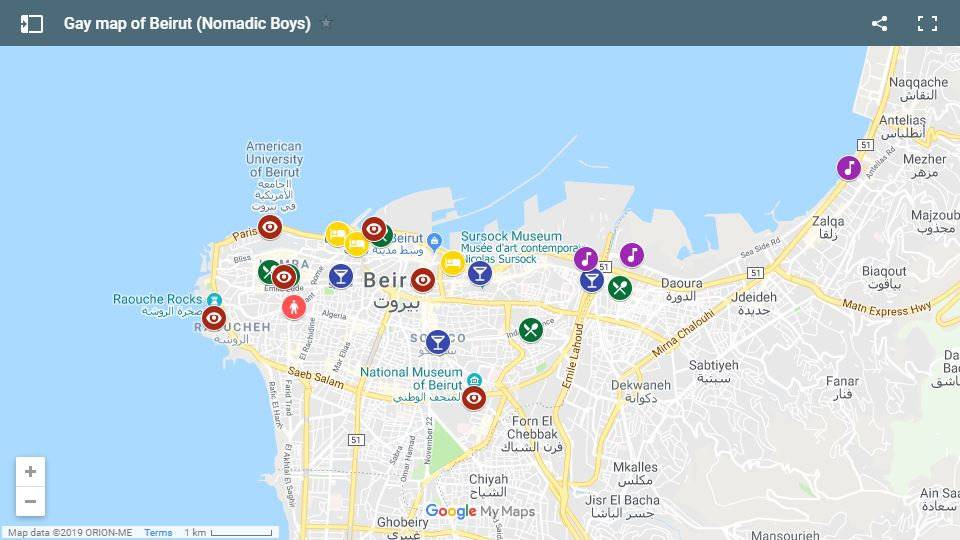
Tony
Monday 21st of July 2025
Hi I was wondering which saunas or hamams you recommend. I understand if you cant put them on this platform if you can email me that would be great. Thank you in advance
Stefan Arestis
Tuesday 22nd of July 2025
Sadly not, for the reasons you gave :(
eliyas
Thursday 12th of June 2025
Hello💫 I’m commenting for the gay friendly tour guide, I’m trans and queer and travelling with my friends who are also queer, two of us are Lebanese and we’re travelling soon but we don’t know where the queer friendly spaces are so this could be a huge help! Thank you💗
Stefan Arestis
Friday 13th of June 2025
Definitely check out the places we put in this article. But sadly most of it moved underground following the recent crackdowns on the LGBTQ+ community of Lebanon :(
Savio Grassi
Wednesday 10th of April 2024
Is it possible to have the list of Hammams by e-mail?
Stefan Arestis
Thursday 11th of April 2024
For their safety we were obliged to remove them from our website.
Enya
Monday 29th of May 2023
Hi there! your block has been very very helpfull to me since I am gonna be travelling to lebannon this summer! I am lgbt+ myself and was interested in finding some events or places i could go and just general information through a lgbt+ platform. You provide great tips and links that i will deffenetly make good use of! I travel solo and is looking very much forward to go! Appreciating the words you put in the end as to why you travel there and I have similar experience and motivation.
on an ending note, i have a question about getting picked up by the uber at night, what is your experience with that? and if there is any other tip or connection there could be usefull to me as a lgbt+ solo traveller (presenting female), other than what allready provided, dont hold back!
thanks again and happy i found your post here!
Stefan Arestis
Tuesday 30th of May 2023
THanks for your message Enya. We used Uber all the time in Beirut and never had any problems - but we are two men. Given the desperate state of the economy, I would have thought Uber drivers would be more concerned for their rating over and above anything else, but you never know. For your own safety maybe consider pre booking your transfer - see the link in the "How to get there section" in this article.
Alejandro
Monday 10th of April 2023
By the way, Madame Om has re-opened. It has relocated to a red building in Mar Mikael under the new name Om. I visited on a weekend in October 2022 and it was so busy that I couldn't get a seat inside. It's clearly still a gay place but with pretty much 50-50 male/female clientele, which was a little off-putting.
Stefan Arestis
Wednesday 12th of April 2023
Thanks for letting us know Alejandro! Brilliant to hear that as so many queer/queer-friendly venues in Beirut were forced to shut down recently.